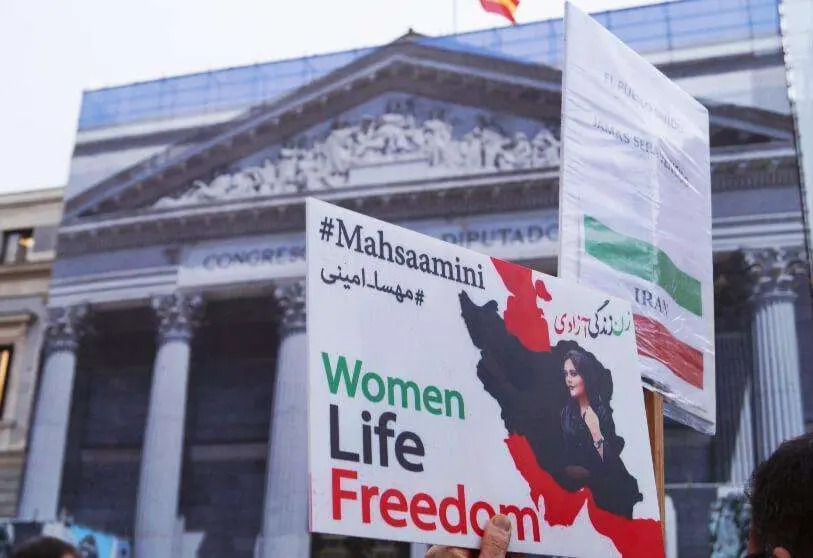"I have decided to commit suicide in the Rhone River. It is a challenge to show that we, the Iranian people, are very tired of the situation. By the time you see this video, I will be dead". These were some of the last words of Mohamed Moradi, a 38-year-old Iranian who decided to take his own life to draw attention to the critical situation in his country.
Moradi, who had been living in Lyon with his wife since 2019, decided to release a video explaining the reasons that led him to take this tragic decision. The Iranian assured that he was acting "without stress or sadness", and that he was doing it to "show everyone that Iranians need help".
Devastating ?#Mohammad_Moradi, an Iranian living in France, recorded this video before committing suicide.
— Masih Alinejad ?️ (@AlinejadMasih) December 27, 2022
He asked the world not to be indifferent to the situation in Iran. “I’d rather die than see my compatriots miserable in Iran”
Rest In Peace #IranRevolution pic.twitter.com/pKWZr6kEYL
"We want to change our country to a democratic country with equal rights for women and men," said Moradi, who also outlined the current situation in Iran. He condemned the violence used by the authorities during the protests. According to NGOs such as Iran Human Rights, at least 476 people have been killed since the demonstrations began.
"Sadly, we have lost many daughters, sons, teenagers and even young children. We have to do something," Moradi said in the video. The Iranian also stressed that he "could not live in peace, comfortably" while his compatriots were being killed. As Iranian activists in Spain from the platform 'Woman, Life, Freedom' point out, many Iranians living abroad suffer from anxiety, depression or a sense of guilt about what is happening in Iran.
Today marks 100 days of antiestablishment protests in Iran. Nearly 500 have been killed in a brutal state crackdown, thousands have been arrested. Yet, Iranians are still protesting. Video from a fresh protest in Karaj where protesters call on “Mullahs” to get lost. #MahsaAmini pic.twitter.com/qfwQ1ZMnZg
— Golnaz Esfandiari (@GEsfandiari) December 24, 2022
Moradi tries in this way to raise awareness and denounce the abuses of the regime in Tehran against the Iranian people, as well as to get the media to report on the situation in the country.
"Moradi committed suicide to make the voice of the revolution heard in Iran," Timothee Amini, a member of the Iranian community in Lyon, told AFP. According to Amini, the Western media "do not transmit" the voice of Iranians. While the war in Ukraine is covered every day, one hears "very little about Iran" in the news, Amini added.
Today, brave people of #Mahabad commemorated the 40th day of #AzadHosseinpour, #MohammadAhmadiGagesh, #KamalAhmadpour, 3 protesters killed by the Islamist regime in Iran. The more of us they kill, the more of us will protest.#IranRevolution
— Masih Alinejad ?️ (@AlinejadMasih) December 27, 2022
pic.twitter.com/jorT0xhUxE
This is echoed by many other Iranians in the diaspora, who call on journalists and the media to talk about Iran and the plight of Iranian citizens.
Lili Mohadjer, an Iranian from Lyon, told the news agency that she hoped "his death would be another element for the Western media and governments to support the current revolution in Iran". Mohadjer, like other compatriots, called Moradi's death a "sacrifice to win freedom", not a suicide.
"May his death serve to keep those of us who are here fighting," stresses Nilufar Saberi, an Iranian activist in Spain.
Protests have continued for 14 consecutive weeks in Zahedan (southeast Iran), despite having suffered hundreds of casualties. Their slogans denounced executions and @khamenei_ir and called for the release of political prisoners. pic.twitter.com/3hj73fZS4K
— Karim Sadjadpour (@ksadjadpour) December 23, 2022
In addition to the media, Iranians in the West are calling on governments to take stronger measures against the Ayatollahs' regime, such as sanctions against the political and military elite, the expulsion of ambassadors or the suspension of all relations with Tehran.
Countries such as Canada have already imposed sanctions against members of the Revolutionary Guard, while politicians in Germany, the Netherlands and other European nations have begun to "sponsor" Iranian prisoners on death row.
Free them all. #StopExecutionInIran #HowHealthyIsToomajReally https://t.co/9IEruVwHRb
— Ye-One Rhie (@YeOne_Rhie) December 28, 2022
The latest country to take action against Tehran's abuses and violence has been Italy, which has summoned the Iranian ambassador to protest the "unacceptable" response to women-led protests in the Islamic republic. Italian Foreign Minister Antonio Tajani has condemned the violence in Iran, describing the situation as an "unacceptable disgrace" and assuring that Rome has taken "a hard line" in defence of women.













